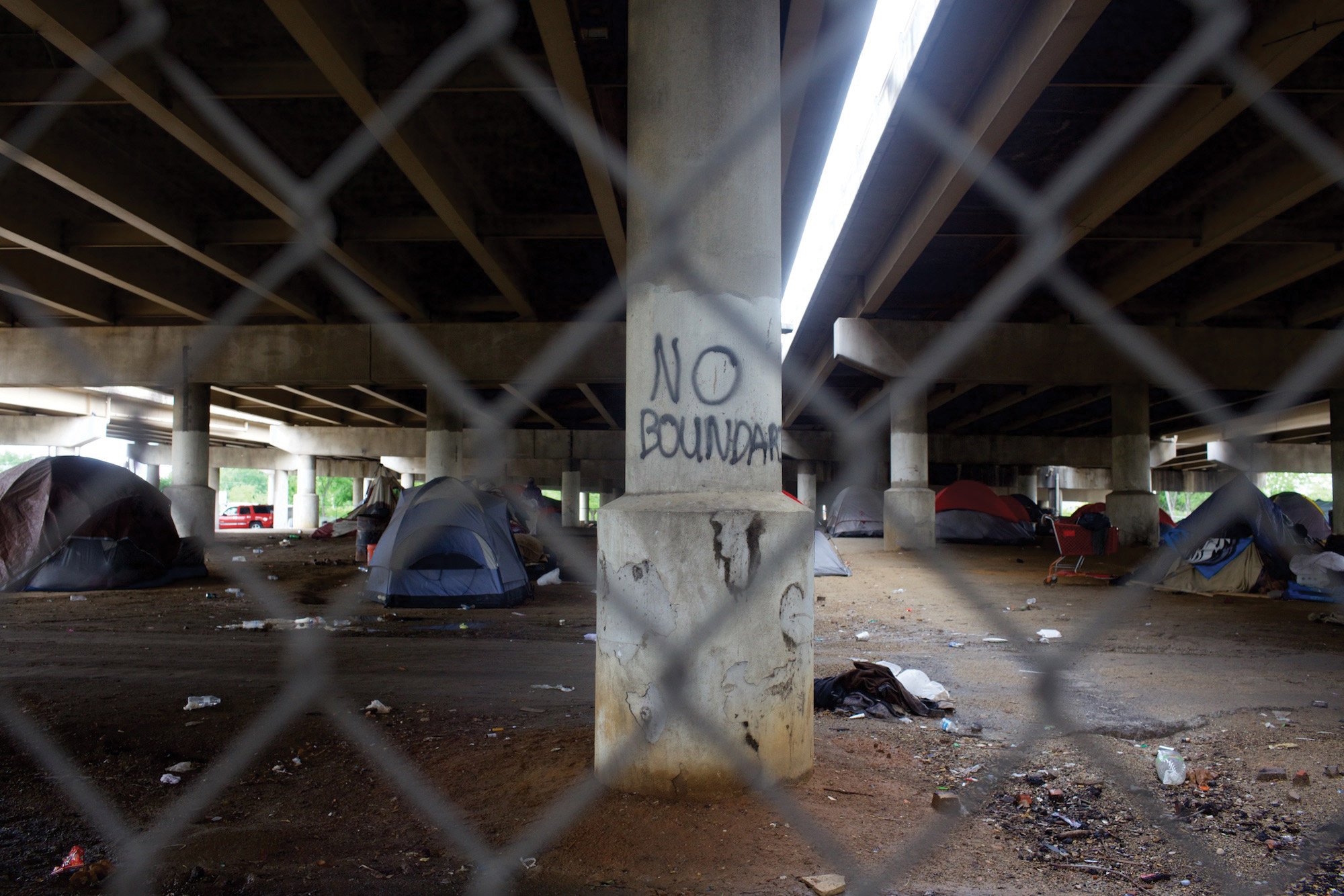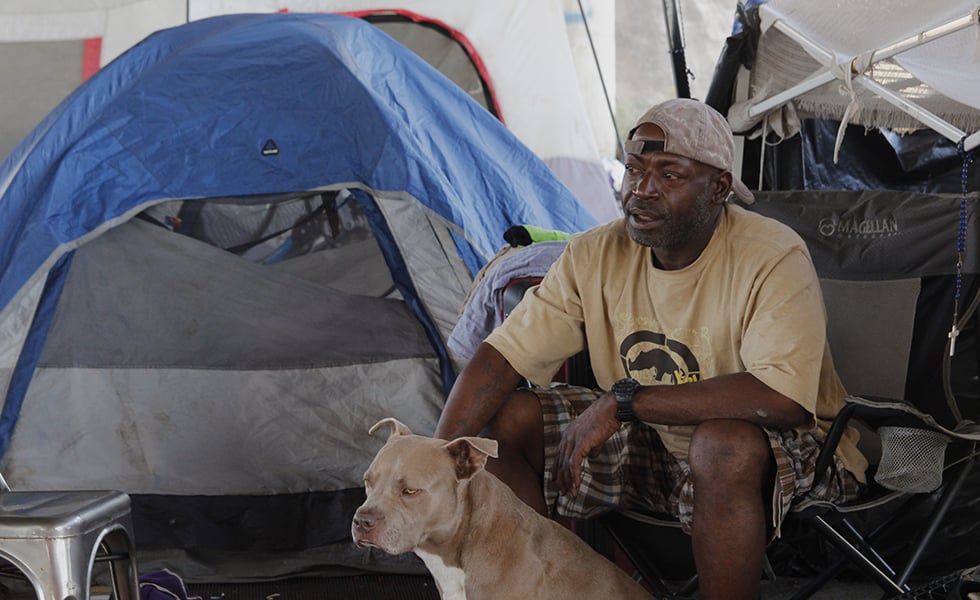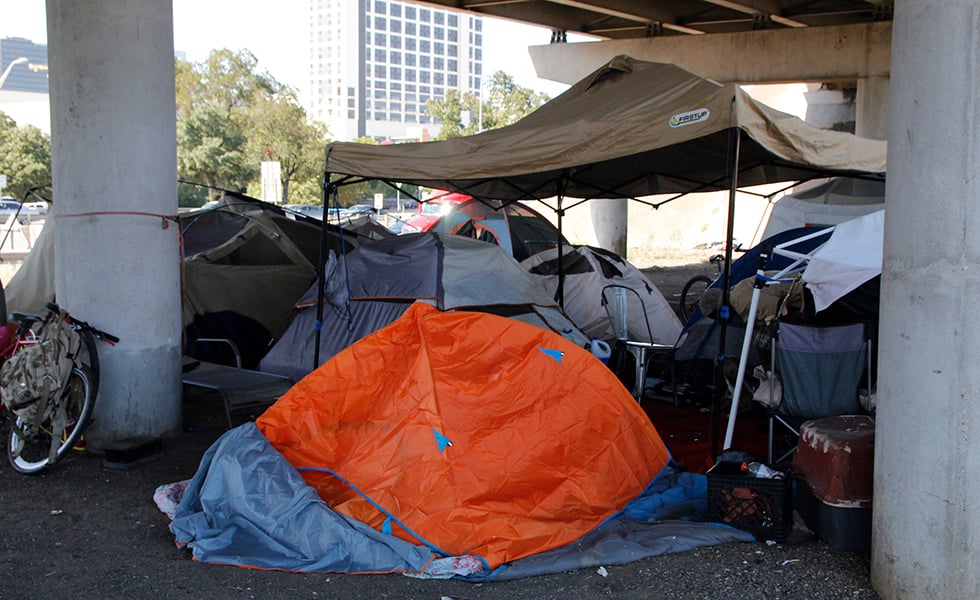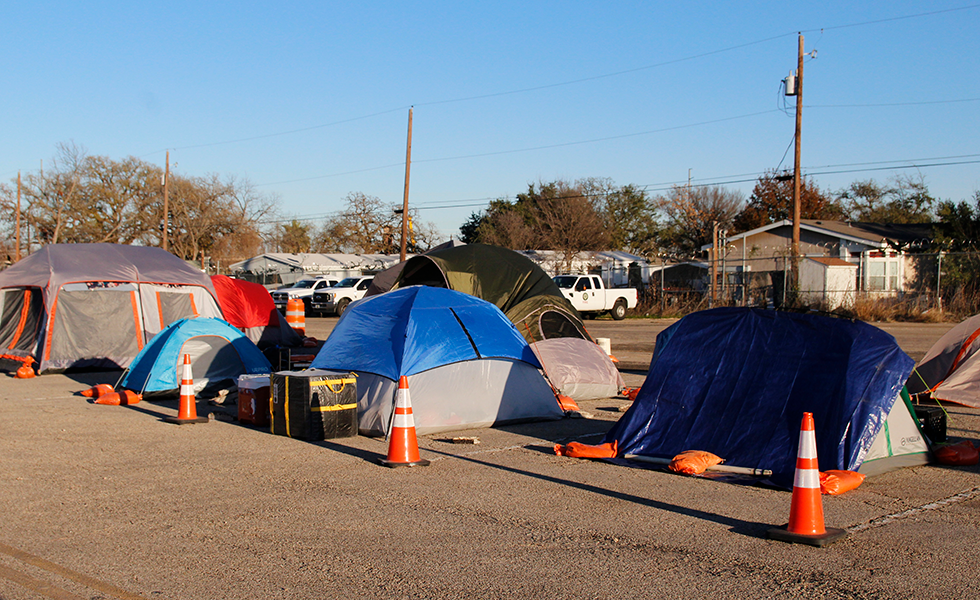
Greg Abbott’s ‘Indefinite,’ Imperfect Homeless Camp
Scenes from Abbottville.

Just off Highway 183 in southeast Austin, twin rows of weathered, garage-like structures line a mostly vacant 7-acre paved lot. The property, a former maintenance yard for state-owned vehicles, lies between a mobile home park and a heavy equipment dealership. It’s an austere setting. Yet as of mid-December, some 60 homeless Austinites reside here. There’s limited electricity, no proper showers, and it’s far removed from existing homeless services. Still, some see it as the best available option. Welcome to Abbottville.
In early November, Governor Greg Abbott opened the land, owned by the Texas Department of Transportation (TxDOT), to Austin’s unhoused. The move puzzled advocates. For months, Abbott had incessantly smeared the city’s homeless as violent and disease-ridden, part of his crusade against local leaders for relaxing laws that criminalized the unhoused. The governor had also just ordered TxDOT to commence disruptive weekly clear-outs of homeless camps under the city’s highways. Now, he had a solution that seemed less than innovative: another camp.
Still, Abbottville is growing. The 24 structures, or storage bays, are all occupied. After sweeping out thick layers of dust, residents pitched tents inside and pinned up tarps for doors. New arrivals have now set up about 15 tents in an uncovered area toward the back of the lot. Many moved here from the woods, looking for better shelter from the cold and rain. Some became homeless within the past month, and moved straight here. Others were pushed here by TxDOT’s frequent clear-outs.
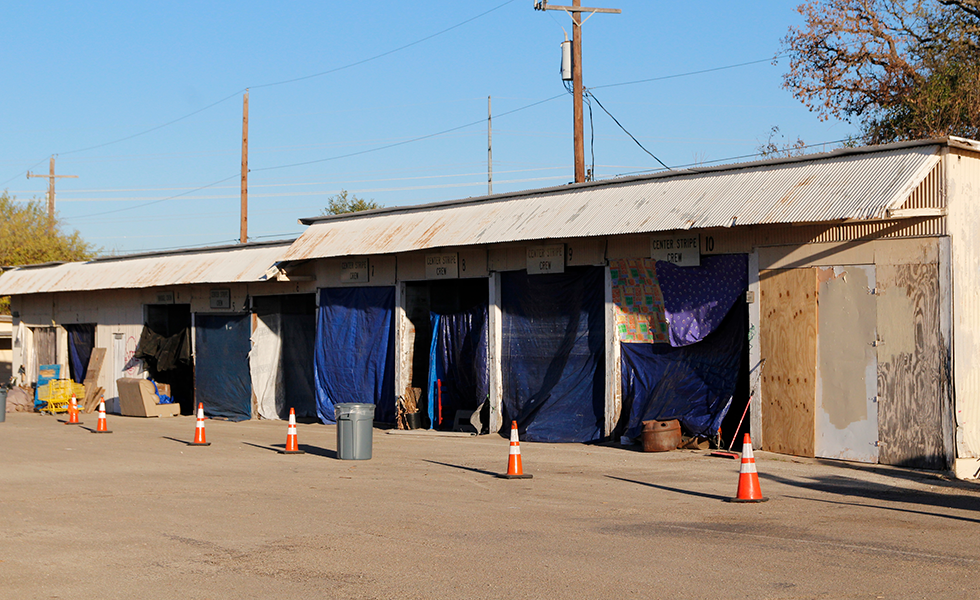
Kay, 58, searched for a job for six months before she and her 16-year-old son were evicted from their South Austin apartment in October. They couldn’t go to the Salvation Army shelter downtown with their dog, a year-old mutt named Loki, so they pitched a tent under State Highway 71. A month later, TxDOT began arriving. Every Monday morning, Kay would have to move all her possessions off-site and wait for the cleanup to finish; if she wasn’t there, her stuff would be confiscated. “So I asked myself: ‘Do I want to stay here and keep playing this game with them?’” she told me Tuesday at Abbott’s camp, where she lives now. “I just couldn’t imagine going through that stress every week.”
Kay’s grateful for her space at the camp, where she and her son each have a tent and some protection from the elements, and she appreciates the three meals a day provided by various charities. But she feels hopeless about finding work: There’s no Wi-Fi, and she struggles to bathe regularly. There’s a makeshift outdoor shower, but the water is too cold to tolerate in winter. “I’m not really living; I’m just here,” she said. A friend drives her son to high school each morning, but his return journey often takes an hour and a half, involving two buses and a slog through a field that connects the camp back to the Montopolis neighborhood.
Kay’s on an affordable housing waitlist, but doesn’t know how long it will take. She’s hoping Abbott will keep the camp running until she gets permanent housing. “If the governor doesn’t want people back on the street, it’s gonna have to stay open,” she said.
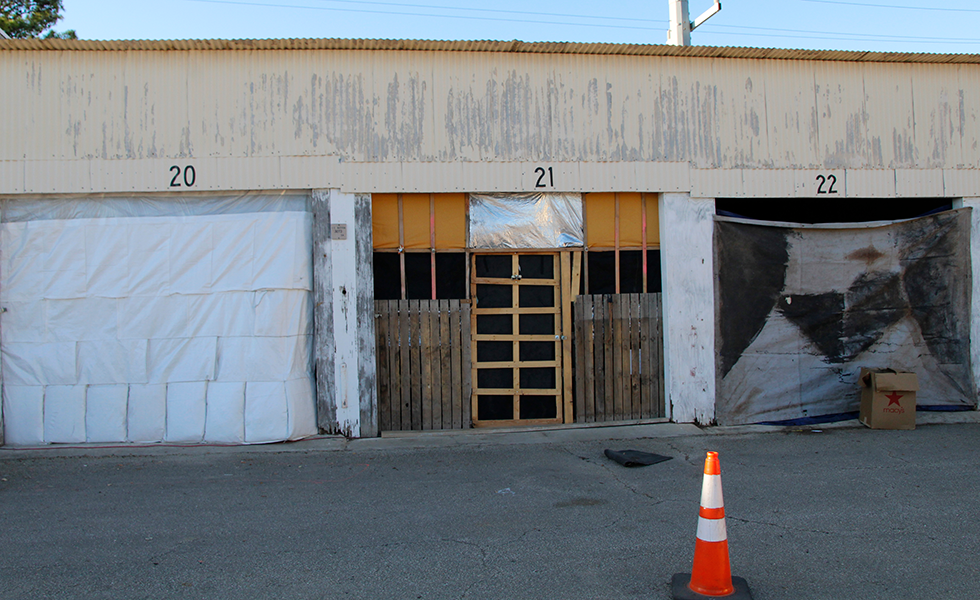
But there’s the rub. Abbottville was only supposed to last for a couple months. The governor’s idea was to open a temporary camp until a chamber of commerce-led coalition, ATX Helps, could build a 300-person mega-tent shelter close to downtown. In November, that coalition announced they aimed to raise $14 million for the shelter and get it built by early 2020.
But ATX Helps, apparently, is in need of some assistance itself. Despite wealthy business backing, the coalition has scraped together only $72,000 in six weeks of fundraising, according to a spokesperson. The coalition has moved its target date back to the “first quarter of 2020,” and the spokesperson said the group is now considering locating the mega-tent on the same state-owned lot as Abbottville, about five miles from the city center.
If the tent does get built, there’s no guarantee people will fill it. Everyone I spoke to balked at the idea, saying the cramped conditions would cause conflict and trigger PTSD and anxiety. “It has fight written all over it,” said Chuck, a 36-year-old camp resident who said he’d prefer returning to the woods over a mega-tent. Like others, he’d like to stay in his bay at the governor’s camp until he gets housing.
Summer Ray, a district coordinator for the Texas Division of Emergency Management, which manages day-to-day operations at Abbottville, told me the timeline for the camp is “indefinite.” The governor’s office did not respond to requests for information, including about the timeline and operating cost.
At least one resident, Robert Rhodes, is growing disillusioned with the place. When I first talked to Rhodes, 54, about a month ago, he sang the praises of Abbottville. But on Tuesday, he complained bitterly that, despite winter setting in, the bays still lacked electricity and no proper shower had been installed. “I have a big challenge for the governor’s office: I’d like to see them come here with just a tent and bedding and spend 24 hours here,” Rhodes said, adding that despite a state trooper’s 24/7 presence, there had been drug use and fights at the camp.
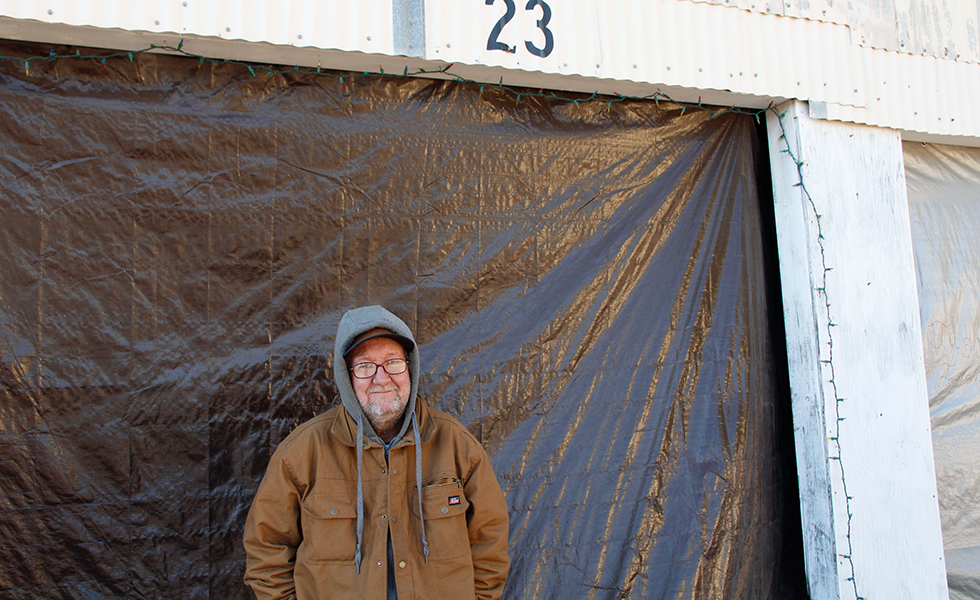
Local homeless service providers, who were never consulted about Abbottville or the chamber’s mega-tent, generally prefer that funding go to permanent affordable housing. The city is in the process of paying $8 million for a centrally located hotel to convert into a shelter, and it recently paused plans to buy a second hotel due to zoning issues.
Meanwhile, TxDOT continues to clear out encampments under highways every Monday. Many unhoused Austinites diligently move their belongings each week, then simply return. Others have retreated back into the city’s wooded areas. In some parts of town, camps are growing on wide road medians, outside of TxDOT’s jurisdiction. It might be a tad less visible, but Austin’s homeless problem remains unsolved. Judging by his newfound silence, though, the governor seems to be losing interest.
Read more from the Observer:
-
The Fantastic World of Cande Aguilar: The wildly imaginative Brownsville painter fuses pop culture with abstraction, family life, and his love of South Texas.
-
Why a Small Offense Shouldn’t Have Life-Altering Consequence: Nearly 10 years ago, I was arrested and detained in jail for 45 days after failing to appear in court for a low-level, non-violent offense. Today, I’m fighting so that others don’t have to go through what I did.
-
Federal Report Flags High Rates of Sexual Abuse in Texas Juvenile Lockups: In three Texas youth prisons, at least one in seven juveniles says they’ve been sexually victimized, according to a new report from the U.S. Department of Justice.
